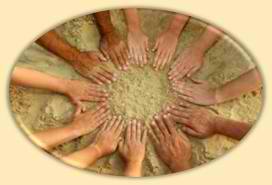Generous Stewards — Cooperative and Connectional
I got to thinking: What are the primary attributes of generous stewards, as they manage, share and use the gifts God has entrusted to them? For me, it comes down to four sets of “C”s.
 The first set is “cooperative and connectional.” Generous stewards tend to choose connection over competition with others. An intriguing article in The Guardian 1 noted several studies of this behavior. It says we have strong influences that foster competition. It starts in schools, where the emphasis on exams and attainment can instill the idea that success is about doing better than others. And it’s reinforced in many of our workplaces, where employees compete for performance-related awards.
The first set is “cooperative and connectional.” Generous stewards tend to choose connection over competition with others. An intriguing article in The Guardian 1 noted several studies of this behavior. It says we have strong influences that foster competition. It starts in schools, where the emphasis on exams and attainment can instill the idea that success is about doing better than others. And it’s reinforced in many of our workplaces, where employees compete for performance-related awards.
But research at the University of Pennsylvania’s Wharton School shows that “’givers’ – people who help others without seeking anything in return – are more successful in the long term than ‘takers’ – who try to maximize benefits for themselves, rather than others.” And there’s a growing body of evidence (including at the University of Warwick) that when people feel happier and more connected, they are more productive at work.
Ministries that emphasize cooperation naturally lead to a sense of connection. For example:
- Victory Memorial United Methodist Church in Guymon, OK radiates connection with a strong mission mindset and a huge clothing ministry; financially supports local services for seniors, the hungry, and the homeless; are committed to international mission; and host a four-year-old Hispanic congregation.
- The Slate Project, a young church in Baltimore, MD, is a joint project of the Episcopal Church, the Presbyterian Church (USA), and the Evangelical Lutheran Church in America. One denomination donates the space, another gave several years of fund, and two others provide staff. Participants gather both online and in person, pray and read Scripture together, host an open mic night for people to share their stories, and invite artists to work with them for a season.
Cooperation and connection naturally lead to spiritual outreach, which one ministry consultant 2 says has two key elements:
- Focus on personal faith experience of God, and the transformation God can bring about; and
- Relationship to our daily lives, including education, health, childcare, legal matters, family relations, and mental health. He concludes, “It’s about real people with real needs, and real spiritual resources.”
As stewards of God’s Good News, and of our relationships with one another, how do we foster cooperation, connection, and spiritual outreach?
Your partner in ministry,
Betsy Schwarzentraub
1 – www.theguardian.com/sustainable-business/2015/mar/20/key-to-happiness-not-competition
2 – Michael Rivas, a consultant for the United Methodist National Plan for Hispanic and Latino Ministries


